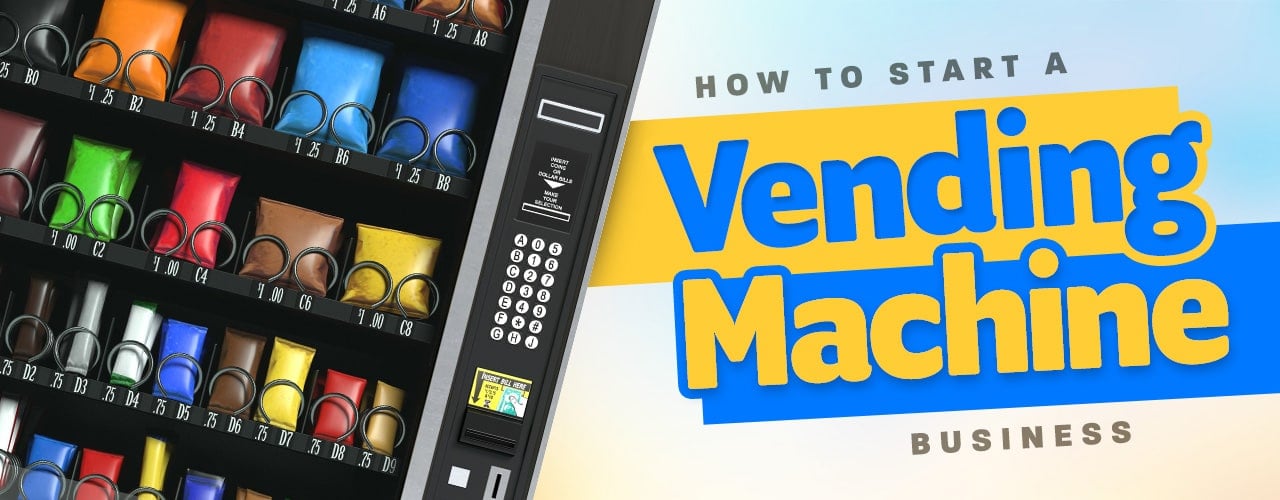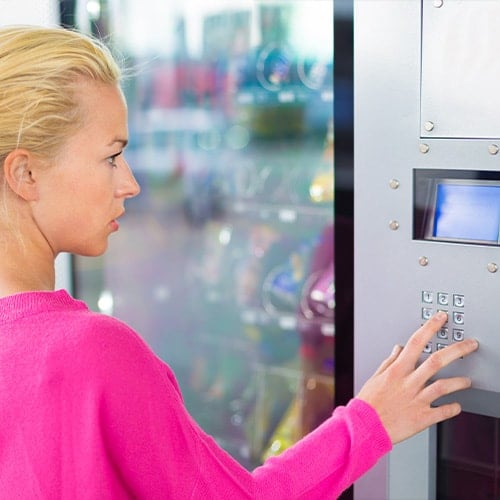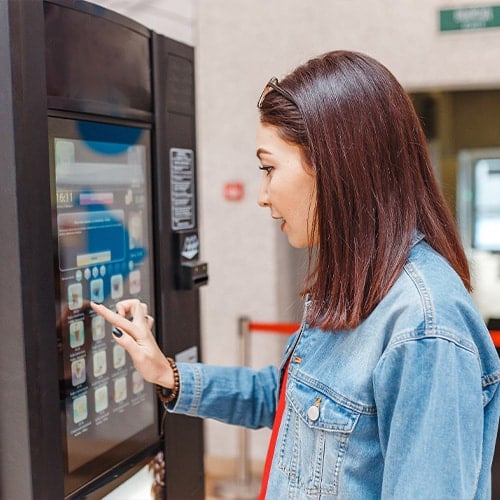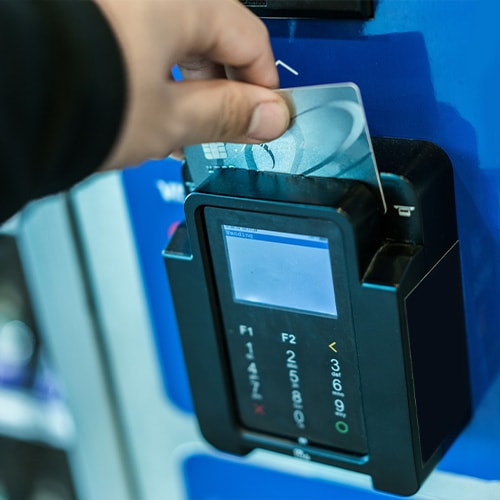
Starting a vending machine business presents a unique opportunity due to its hands-off nature. When combined with a low cost of entry, high growth potential, and low risk, starting a vending machine business seems like a great business venture. Regardless of whether you’re an experienced business owner or a new entrepreneur, opening your own vending machine business is a potentially lucrative option to take advantage of. If you’re looking to generate passive income and start your own vending machine business, check out our vending machine startup guide below.
Shop All Vending Machine SuppliesWhat Is a Vending Machine Business?
 A vending machine business is any business that makes money from selling products from one or more vending machines. Customers pay at the vending machine and the items are dispensed. Due to the automation and simplicity, a vending machine business is a great side-hustle for those looking for hands-off passive income. An operator just needs to purchase and stock a vending machine and then income can start flowing in.
A vending machine business is any business that makes money from selling products from one or more vending machines. Customers pay at the vending machine and the items are dispensed. Due to the automation and simplicity, a vending machine business is a great side-hustle for those looking for hands-off passive income. An operator just needs to purchase and stock a vending machine and then income can start flowing in.
1. Vending Machine Business Plan
Creating a solid business plan is a great way to map out future ideas and goals, setting a vision for the future of your vending machine business. In this plan, you will outline topics such as strategies, expenses, and a break-even point, all in one location. Should you want to expand your business in the future, a business plan will make it easier to secure loans. In order to create an all-encompassing business plan, you should include the following:
- Executive Summary - Written after the rest of the business plan is finished because it summarizes all of the information contained in your business plan.
- Company Description - Outline the basics of your vending machine business, including specifics such as projections and goals.
- Concept - Discuss what type of vending machine you’ll operate as well as the inventory you plan to stock your vending machine with.
- Management and Ownership Structure - Disclose if there are any business partners involved in your vending machine business and if so discuss the management hierarchy.
- Employees and Staffing Needs - If you plan on expanding your vending machine business to the point where employees are required, outline what positions need to be filled and how they will help your business operate.
- Marketing and Competitor Analysis - Analyze potential competitors and outline your business’s strategies to outshine the competition.
- Advertising and Marketing Strategies - Discuss potential marketing and advertising strategies that can be used to gain customers and grow your business.
- Financial Summary - Cover financial information such as a break-even analysis, sales projections, assets, and liabilities.
For a more in-depth guide on how to write a solid business plan, check out our business plan guide.
2. Vending Machine Products

The inventory you stock your vending machines with will be a huge factor in how successful your business will be. When deciding on what to stock your vending machines with, consider factors such as location, target market, and cost of goods. It may be a smart idea to stock vending machines in different locations with different products because some items sell better in some locations than others. Here are some of the most popular products to stock your vending machine with:
- Candy - Individually wrapped snacks like candy are popular in vending machines, as many different consumer groups love sweets. Brand loyalty to brands like SNICKERS® and Hershey’s makes it easy to entice customers.
- Chips - Chips are the perfect salty complement to candy in a snack vending machine, being another popular snacking option consumers love.
- Water - Bottled drinks such as water are a beverage option that sells well in just about any location, including gyms, amusement parks, and schools.
- Soda - Soda and other carbonated beverages are a popular option in vending machines. Offering a variety of different products and flavors of soda appeals to a wide consumer audience and is a great way to boost sales.
- Energy Drinks - A popular alternative to coffee, energy drinks provide customers with a burst of energy to make it through the day. For this reason, energy drinks sell well in locations such as offices and schools.
- Sports Drinks - Sports drinks are a great beverage to sell to health-conscious consumers, especially in locations such as gyms and fitness centers.
3. Vending Machine Supplies
To start your vending machine business, you’re going to need a handful of supplies before you begin making sales. Unlike starting some other businesses, very little is required to start a vending machine business, lowering the barrier of entry. Here is a list of supplies you’ll have to acquire to start and expand your vending machine business:
- Vending Machines - Each time you expand your business, you have to purchase another vending machine to place at a new location.
- Inventory - Vending machines need to be filled with a variety of different products for customers to purchase.
- Parts and Accessories - Vending machine parts and accessories will be required to replace shelving and make repairs to malfunctioning machines.
- Transportation - Transportation supplies such as vending machine transporters will be required to move and set up vending machines at new locations.
4. Vending Machine Licenses

Many rules regulate the operation of vending machines, and there are some permits that need to be acquired. Laws and permits covering vending machines vary from state to state, so make sure you double-check your local laws. There may also be varying regulations depending on where you place your vending machine. For example, you may be limited in what you’re able to sell in a school vending machine. That being said, here are some of the most common vending machine permits and licenses required:
- Business License - All businesses in the United States require a business license to operate. Business license requirements vary from location to location, so do your research on what is required from your business license in your state.
- Employee Identification Number - An Employee Identification Number (EIN) is needed for identification purposes. You can’t hire employees without an EIN and the process can be lengthy, so be sure to apply for your EIN early in the formation of your business.
- Vendor License - A basic business license that needs to be obtained before you can sell food items within a location.
5. Vending Machine Locations
When it comes to vending machine profitability, location is key to success. A vending machine should be placed in a location that gets a lot of foot traffic and people spend a lot of time in. Additionally, you’ll want to place your vending machine in a location that doesn’t charge high commissions or fees. If you’re looking for a location to start your vending machine business, here are some of the best places to maximize the success of your vending machine:
- Gyms - Gym-goers looking for a post-workout snack are a great audience to target with vending machines. Gym vending machines can be especially successful if you offer healthy foods and beverages like granola bars and sports drinks.
- Schools - Vending machines in schools can be high-earners, capitalizing on snacking habits of teenagers and young adults. Students love to pick up a quick snack or drink while studying or in between classes, making school vending machines profitable.
- Airports - Airports involve a lot of waiting around for customers due to layovers and delayed flights. Vending machines in airports can cater to these customers, offering snacks and drinks while they wait for their flight.
- Hotels - Hotel vending machines are potentially lucrative, taking advantage of tourists looking for quick food items. Vending machines offer a convenient alternative for guests who aren’t looking to eat at a hotel restaurant.
- Office Buildings - Office buildings that house 50 or more employees are a fantastic location for vending machines. Office workers get hungry and thirsty working throughout the day, leading them to purchase snacks from vending machines and similar micro markets.
- Malls - Malls have a high amount of foot traffic, meaning there are a lot of potential customers. As customers get hungry from shopping around, they're likely to check out your vending machines and pick up a few snacks.
6. Vending Machine Jobs

While it is possible to run a small vending machine business on your own, once you start to branch out and expand you’ll need to hire some employees. The everyday tasks of these employees can range from stocking and maintaining your vending machines to mapping the future of your business. These employees help you maintain the progress you have already made with your vending machine business and make it easier to plan out a successful future. Here are some of the most common positions vending machine businesses consider:
- Technician - An experienced vending machine technician must perform regular maintenance and answer repair calls.
- Driver/Stocker - A driver/stocker may be required to load supply trucks and stock vending machines in different areas.
- Retail Merchandiser - Larger vending machine businesses can benefit from having a retail merchandiser analyze performance metrics and work towards improving sales.
- Field Sales Consultant - A field sales consultant handles negotiations with on-site locations and brainstorms ideas for new vending machine sites, making it easier to expand.
Back to Top
7. Vending Machine Advertising
Although a good chunk of your profits stems from impulse sales generated by foot traffic, advertising is still important to a vending machine business. Vending machine advertising ranges from methods designed to alert traffic of your vending machine’s presence to reaching out to customers and alerting them of your machines’ locations. Here are some of the most common types of vending machine advertising to engage in.
- Brochure - A physical brochure that lists all your machines’ products and locations can be posted for customers to see and pass around.
- Website - A strong website that highlights the locations and offerings of your vending machine is a great way to advertise your business and inform prospective customers.
- E-mail Marketing - Reach out to other businesses and customers in your machines’ locations via email, advertising where your vending machines are located and what products they sell.
- Signs - Although a more traditional form of marketing, large eye-catching signs can grab the attention of foot traffic and direct them toward your machine.
8. Starting a Vending Machine Business

Unlike the start of some other businesses, a grand opening isn’t required to kick off your vending machine business. However, the start of your business is still critical and you’ll want to ensure everything runs smoothly. You'll want to keep your vending machine well-maintained and stocked during its launch period, ensuring no problems occur. Giving customers a positive first experience with your equipment makes them more likely to come back, establishing a customer base that could lead your vending machine to become a big earner.
Vending Machine Business FAQ
We cover some of the most common vending machine business questions below:How Much to Start a Vending Machine Business?
The cost to start a vending machine business varies greatly, as there are many varying factors you have to consider. Around $2,000 is the minimum requirement to start a vending machine business, allowing you to purchase a used vending machine and enough inventory. However new vending machines can cost anywhere from $4,000-$10,000, so if you plan on utilizing brand new equipment, you’ll have to invest more initially. Also, inventory needs to be considered, as selling expensive higher-end products in your vending machine will force you to raise your initial investment as well.
Are Vending Machines Profitable?
Although each situation is different, on average vending machines are usually profitable. Even when expenses like rent and commission fees are factored in, vending machines will typically turn a slow profit. Some vending machines may produce a small profit, earning anywhere from $20-$50 profit a week. However, vending machines that are well-run and placed in high-traffic areas could earn hundreds of dollars of profits a week. As your vending machine business expands over time you’ll have a handful of big earners along with other vending machines that churn out a smaller weekly profit.
What Is a Micro Market?
A micro market is a food retail space that has self-checkout technology. Although similar to vending machines, there are some slight differences. Both are automated vending options that allow for self-checkout, but micro markets have a more diverse selection of healthier options and open-style purchasing. However, vending machine businesses have a lower cost of entry and offer cheaper products, making a vending machine business easier to start.
Back to TopWhen executed correctly, starting a vending machine business can generate hundreds of dollars every week in profits. With such a low cost of entry and low involvement, vending machine businesses are perfect for those looking to dip their toe into the world of entrepreneurship. Vending options in high-traffic areas like hospitals and schools don’t appear to be going away soon, making this the perfect time to start your own vending machine business.





